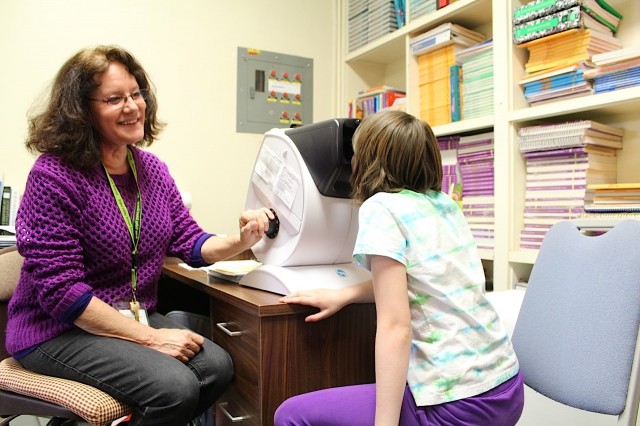Public Charter Schools Have Highest Opt-Out Rates
That exemption rate is driven by huge percentages of vaccination opt-outs at public charter schools in the county, led by Yuba River Charter School in Nevada City. In the current school year, 81 percent of kindergarteners at the school received personal-belief exemptions.
Caleb Buckley, director of the Yuba River Charter School, said many students’ parents steer clear of Western medicine and, by association, its core tenet that immunizations save lives. “I don’t know too many that go to see the local pediatrician group, unless they really have to,” Buckley said.
As Trevor Michael, president of the Nevada County Board of Education, explained, “Our county is rural. People live alternative lifestyles and have alternative beliefs.”
At Grass Valley Unified, Ettl hears parents state that it is better for a child’s immune system to get the disease than the vaccination, and that polio is passé. And even though a research paper alleging a link between vaccinations and autism was retracted, deemed a fraud by the British Medical Journal and its author stripped of his medical license, they say they’re still not sure that a vaccination won’t give their child autism.
“I don’t argue with them,” Ettl said. In the past, when she has refuted their claims, “They get mad and head right to Holly,” she said, referring to Holly Hermansen, superintendent of the Nevada County Office of Education.
[Related: More California Parents Opt-Out of Vaccines -- Look Up Your School Online]
At some charter schools in the county, a philosophical opposition to vaccinations has become a defining feature of the culture, said Sharyn Turner, coordinator of school health services at the Nevada County Office of Education.
“All of a sudden it becomes socially unacceptable to be one of the few parents immunizing your child,” Turner said.
Public charter schools lead the state in enrolling the highest percentage of kindergarteners with personal-belief exemptions – 10.1 percent in 2013-14, according to new data from the California Department of Public Health. At private schools, 5.6 percent of kindergarteners received personal-belief exemptions, while 2.3 percent opted out at public schools.
Those high rates are driving an overall increase in personal belief exemptions statewide. The percentage of exempted kindergarteners more than doubled, from 1.4 percent in 2007 to 3.1 percent in 2013-14, according to the state Department of Public Health.
Fading Awareness of Dire Infectious Diseases
If roughly 90 percent of a population is fully vaccinated, “herd immunity” helps keep at bay infectious diseases including measles, pertussis or rubella. But with longstanding herd immunity comes fading awareness of dire infectious diseases. “There’s no fear,” said Lindsay Dunckel, executive director of First 5 Nevada County, which funds community programs for babies and young children. “These diseases that were once so frightening have disappeared.”
Now some of them are coming back, and the role of unvaccinated people in spreading disease is under scrutiny. In 159 cases of measles across the country last year, 82 percent of those infected were unvaccinated and of those, 79 percent had philosophical objections to vaccinations, according to the CDC.
So far in 2014, the California Department of Public Health has received reports of 51 cases of measles in the state, the largest number since 2000, when measles was declared eliminated in the U.S. In the decade before the introduction of a measles vaccine in 1963, the disease killed about 450 people a year in the U.S., according to the CDC.
Also increasing in California is the number of cases of pertussis, better known as whooping cough. Reported cases in 2013 hit more than 2,300, including an infant who contracted the disease at 4 weeks old and died. During a 2010 California outbreak of pertussis, in which 10 infants died and more than 9,000 cases were reported, children with personal-belief exemptions played a role in transmitting the disease. Communities with high rates of personal-belief exemptions were 2.5 times more likely to also have pertussis clusters.
Can the New Law Help Raise Vaccine Rates?
At Grass Valley Unified, Ettl met recently with a parent of an incoming kindergartener who was dead-set against immunizations. The meeting was perfunctory: The parent read the vaccination information sheet, and Ettl explained that an unvaccinated child may not attend school for 21 days if an outbreak of whooping cough or measles occurs. Then Ettl and the parent signed the new personal belief exemption form.
Ettl’s hopes, and the hopes of public health officials, rest largely with parents whose opposition to vaccination is not entirely locked in. “‘I’ll ask, ‘Are you against every vaccine or some of them?’” she said.
One mother of a kindergartener recently told Ettl that although her child had received one vaccination, she was now inclined to opt out of the rest. Ettl talked to her about the risk of tetanus, a bacterial infection that can be contracted through a wound or animal bite. “We live in a rural place and tetanus is a serious disease,” Ettl recalled telling her. “I said, ‘Why don’t you start with one?’”
The mother left without a personal belief exemption in hand, saying she would think about it.
That’s just what the law is intended to do. The state of Washington passed a similar law in 2011 and its opt-out rate has dropped about 40 percent.
“Some parents are never going to change their mind,” said Catherine Flores Martin, director of the California Immunization Coalition, “but there is a larger number that want to have their vaccine concerns acknowledged and answered.”
